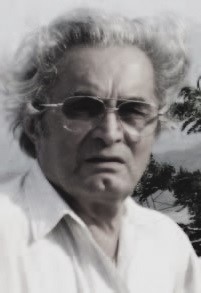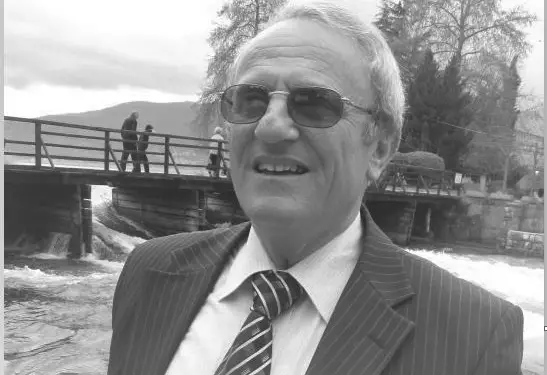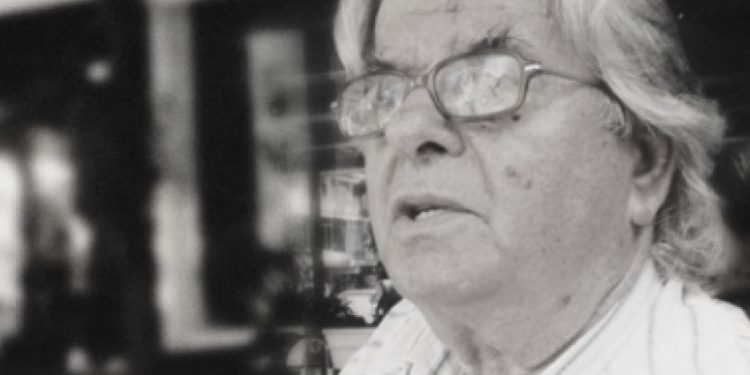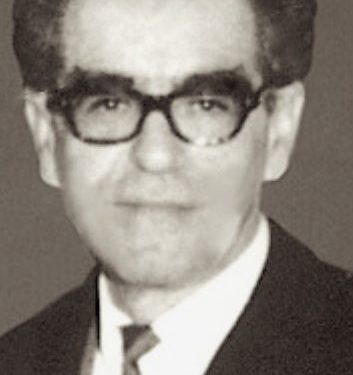From Shpendi Topollaj
-Reflections on the book of Tahsin Xh. Demiraj “In the eye of the cyclone”-
Memorie.al / in the memory of our people, that event of 1991 will hardly ever be erased, which, as it came suddenly, was called just as suddenly: Exodus. We had almost never heard this word before. Or even those who had encountered it somewhere never thought that it would become our daily headline. The exodus was painful. A bit tragic to say the least. We lost our relatives, friends, companions. Men, women, but also old people and even small children fled. They ran away without knowing where they were going. They were running towards the unknown, the one they hadn’t tried, but which, in any case, had to be much better than the hell they were leaving behind. On the spot, they didn’t think long. They were as lost as they were. Worse, there was nowhere to go. Those of us who remained were sent away with tears in our eyes, as they waved at us from the top of those ships that no one knows how they didn’t sink.
They wanted to lie to us again; “Fundres are gone” – they told us. But it was clear to us that they were good people, who loved their country very much, but he was driving them away. And not because of him, but because of a clique of vile people, greedy for power and blood. There were many, many honest people there. There were also intellectuals. And one of these was the wonderful Tahsin Demiraj, that artist and ardent anti-communist.
When he finally saw that the prayer of an entire people; “Oh great God, we beg you once more…! We’ve really bothered you a lot… put your hand on your heart this time too… Aaaman oh god, put an end to this cyclone that saw us as a race, raided us, knocked us down, flattened us to the ground,” was heard, between thousands and thousands of Ikanaks who had run out of patience, Tahsini who had been looking forward to this day, along with his wife and little son, left our city.
We who knew and loved him experienced his departure with deep sadness. We would no longer have among us, that charming man, with that suggestive look and firm, melodious voice, – these traits of an actor playing the part of some epic character. He really had a strong connection to the stage, but he was aware that in life, he was playing himself.
He had had a troubled life, in a country terribly troubled by the worst cyclone, that of politics. And not of any politics, but the communist one, where most have the right to say like him, that; “Life has hit me hard.”
He had boarded that ghost ship, this tearful man, who still had a doubt, when he heard the calls and exhortations of some strangers: “Run, run”! They had said; “…we took it with a rifle and we will release it with a rifle…”!
And, in truth, just as they had sworn, they did, they did not let him go, they told us to run away, we who survived, they told us to run away and we blindly ran away without knowing what we were doing, we ran away, we took escape… and Albania was left for them again. They had sworn not to let him go and they didn’t let him go, they told us to leave, to stay only in Albania, so that Albania would remain only theirs…!
The flight of the crowds was not simple, the unprecedented exodus, it was well studied by them…! They were again vicious lessons that they had no choice but to be different, the country was emptied of the dissatisfied, the persecuted and the persecuted, and so the tyrants remained again, without a thorn in their side…! “The entire national wealth remained in their hands, made with blood and sacrifice…”!
These thoughts were never shared with Tahsin even there and abroad. He had occasional pangs of conscience, that maybe he was wrong to turn his arms to the homeland. He was tormented by the question that many others like him asked themselves: “Wouldn’t they have stayed when they should have run away and they had run away when they should have stayed”?! He had run away, but he had not taken his heart with him. And as if to prove it, I start writing. Gjersa becomes a whole book, which, when he publishes it, he distributes to his friends and colleagues in Durrës, and throughout Albania.
I, because I expected this book from him that he had titled; “In the eye of the cyclone”.
As I was reading it, I felt like I was talking to my friend who used to be there in his house, he was wearing an ink cloth and sitting on an old chaise longue, he turned to his two year old son and said to me: “Do you see this? There is something to study at the Sorbonne! I laughed then, but he was quite right. For the Sorbonne of our children, he himself, Tahsin Demiraj, had worked, although he did not spare his skills and honesty, he still did not share the fate of the dog.
When Albania was liberated, even though he was a small child, he had seen with his own eyes the first act of the great tragedy that was unfolding, which, like every first act, was the ominous warning of what was to follow. The protagonists were those who, until a short time ago, had played a role in the life of the country and now as poor people, they were driven forward like cattle, tied to each other with pieces of wire or ropes and walked accompanied by the liberators. So it was the time from which he himself remembers:
“Every morning when we left for school, the teacher had ordered us to pass by the bazaar, to see the addicts who were being shaken by the wind, and then to go to school”!
Well, tell me where else have you encountered such macabre things. Remember all the Greek tragedies and I assure you that nowhere, you have seen such inhumane and horrifying scenes, nowhere are children ordered to see the dead before the lessons begin. It seemed that the reality of Albania at that time exceeded even their fantasy. This was the heartless pedagogy of the communists. Thus, they wanted to educate young people, followers of empty ideals, enough to be loyal to the “most advanced” order and its creator, the infamous Enver Hoxha.
The son of a patriotic officer from the time of Zogu’s Kingdom, Tahsini had felt the discrimination, contempt and disregard to the core, that’s why he hated that despotic regime, with all the forces of his soul. When I met him, he had fled from Lushnja and was assigned to a menial job at the Rubber-Plastic Company in Durrës.
From the first conversations with him, the question arose: “How do they waste culture so banally”?! “No, they use it – he corrected – they hate it to death. And they crucify the cultured as an enemy. They believe that the more ignorant a person is, the more he loves the Party. And these have the Party above the homeland. Here is the disaster that we will see where it will lead us”!
Exactly, the path that led us to the abyss of shame, Tahsini describes in this book, quite interesting. There are stories and essays here. They are taken entirely from life, so they are real events, places and names. In them springs the author’s love for the good people with whom he worked. And they are not few. With this, he seems to want to tell us, that he does not intend to take out his mules. We rejoice that he speaks so respectfully of them; many of whom are well-known figures of art, literature and our culture in general. They are those who, whatever that time was, remained immaculate people.
His friend, the poet Faslli Haliti, said it beautifully “… Tahsin Demiraj, the great sufferer of the regime, achieved his goal, he wrote this book, which will not be easily overlooked, because the stories, essays, his memoirs are ruled by life, populated by good and bad people, cultured and ignorant, progressives and conservatives, talented, hindered by the system, mediocre Beniamin of the old system, already. The characters of the stories are mainly a director, inspector, brigadier, secretary of the villainous party, an authoritarian, masculinist, uneducated, ignorant chief of staff who expose themselves with the mistakes they make in speaking and with their vain attitudes in front of subordinates.
Viewed thus, the book may be called; the parade of time. Of that time when a lightning brigadier, who was like “those bulls that go after young heifers” with his meanness, forces the beautiful Anita to drown likes Ophelia, right on Valentine’s Day. But in this book we also see many sharp analyses, especially of the hot period of the great upheaval.
An observant eye had spotted the turn, since the dollar belts came out, in that store where no one could enter before. A girl’s waist belt could be bought for three dollars. This was the first release, but also the first surprise that showed that the system was forced to accept the failure silently.
But Tahsini skillfully captured the release that came next; allowing meatballs, with those narrow carts. With subtle irony, he gives us that world that was falling and that world that was coming. Here’s how he writes: “Koftexhi sprouted like flies after the rain.” There were rumors that they were selling meatballs with dog meat. Around where meatballs were sold, severed tails of dogs were also seen. All kinds of ambulatory carts were made. The traveling army of Koftezhians was taking the situation under control. The meatballs would pull the country out of the precipice. Meatballs were invading Albania…! If only they would decide on pluralism, on the future…!
Even if you didn’t have to have meatballs, even for those who cooked them, only 2 kg. every family could get meat per month, regardless of when they could get it, when it was their turn…! Yes, they took that meat too, if you did the math, removing the bones, eh… how many meatballs would come out…?! It is impossible that from that small contingent of meat, the tempting smell of meatballs would destroy the city from corner to corner…!
It was said that at the train station, in Tirana, the first meatball sellers were arrested for suspicious meatballs…! The cities smelled of roasting meat, domestic animals such as cats, dogs and donkeys were rapidly becoming rare, people were being roasted and eaten, both dogs and donkeys…! This is how Albania, the only “illuminating beacon of progressive socialism”, died.
In the book, the author, talking about this miserable state of affairs, tells us that there were also people, former communists, and patriots and wise, who saw the mistake, or the fault that was made, by deceiving this people. He is talking about the luminary of Albanian dramaturgy, Xhemal Brojë, who, in exile, left a testament of repentance: “I am not afraid of death. But I feel a callus in my soul, a worry that not even the grave will dissolve.
And this not only for my and your suffering and disappointment, but for all comrades and friends, all the persecuted, for the country and the people, before whom we, the former communists, who have laid a stone in the foundations of this ghastly system, must to apologize. We who contributed to bring this cholera, all we have to do is to go to the center of the city, with a can of kerosene in our hands, and by apologizing to the people, put the match on ourselves…”!
Once, Tahsini had given me to read Count Las Kazi’s book “Memorials of Saint Helena”, translated by his father. I remember that on this occasion, the discussions about history started and he told me that we Albanians also have a beautiful history and we can be proud of it. I noticed that he loved his country very much. And you were glad to see that he loved her even more now that she was away from him.
In writing; “Amphitheater”, he says: “This Amphitheater was built 2000 years ago, simultaneously with the Colosseum in Rome, and the activities have been approximately the same. Foreign Greek and Roman troupes will have performed here as well. We were also the protagonists of that splendor and we must have been earlier than Rome, because we are closer to the plot of dramaturgy, because we are even more ancient than them…! In order to find out what we have been and what place belongs to us, our erudite, wise Kadare must say it and seal it…”! Although he knows that Italy is beautiful and the bottom feeds us, Tahsini again closes the book with the words: “We remained foreigners all our lives”.
Maybe he misses the Motherland a lot. And now that he sent us this book, we don’t really feel the absence of a good friend, an early democrat and a big-hearted intellectual. Reading what he has written, we understand that he does not forget us for a moment. And we have added respect for that man who, like an oracle, predicted that our children would study at the Sorbonne, without fearing that someone would tell them that; “Before you come to school, see the addicts over there at the manas of the city”! /Memorie.al














